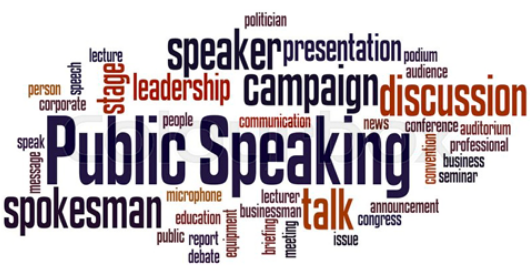Whether it’s a presentation to a small group or a speaking engagement to a large crowd, this article is packed with great advice. It is written by a friend and colleague who I greatly respect and have personally seen manage a room on more than a few occasions. It is my pleasure to introduce you to Nancy Morris by way of sharing this article that she wrote.
5 Common Public Speaking Mistakes
Attitude – The first time I picked up a microphone, I think I was about 6 years old. Over the years, I’ve probably spoken to tens of thousands of people. That doesn’t include those that tune into the live television and radio programs I’m on.
Being on stage is my happy place. It energizes me and, other than perhaps on a sunny beach with a cool drink or African safari with a telephoto lens, there isn’t a place I’d rather be.
That being said, it wasn’t always like this. There have been many times my knees rattled and my eyeballs shook just before stepping out in front of a group. I still get nervous now, but it is the “good” nervous – the kind that keeps you on your toes and makes the whole experience exciting. For everyone.
Just remember, you don’t have to be an expert speaker in order to make a positive impact on your audience.
Action – To be more comfortable in front of a group of any size, there are certain mistakes that are good to avoid:
1. Memorizing or reading your entire presentation. Your audience came to hear you speak to them – not read or deliver a rote, memorized performance. Your responsibility is to communicate with your audience, not at them. By treating your audience as if you were having a conversation in your living room, you will find that you are much more comfortable and in better control of your nervousness. (I sometimes inadvertently swear, because I forget that I’m not sitting at the pub with 100 of my best friends!)
2. Not knowing your material. If you are not familiar with your words or how your speech or presentation is meant to flow, then you are likely to make more errors. Making a mistake or two is not the issue – making a lot of them is!
3. Speaking too fast. I am a fast talker, but I have learned how to pace my presentations, sometimes for maximum effect. Controlling your speed is extremely important if you expect your audience to be able to understand what you are saying. Listening to someone move at 100 mph takes much more energy than listening to them at 75! Incidentally, talking at a furious pace saps your energy as well.
4. Staring at an object on the wall. You should not focus your attention on a spot on the wall or above the heads of your audience. Look the audience in the eye. Make that contact with your listeners, and you will then be aware of their reaction to you. Remember, public speaking is a form of communication. If you are not making eye contact, then you are not communicating. Period.
5. Running out of air. Breathlessness on the podium is one of the most common mistakes made because many novice speakers do not think to breathe. If you wait until you are totally out of breath, you will then be required to inhale a huge amount of air in order to fill your lungs. In doing so, you will experience breathlessness and a tightness in your chest. My advice is to learn to breathe with the support of your diaphragm – truly the best means of controlling nervousness – and then practice supplementing your air supply before you are depleted.
These 5 common mistakes can be easily rectified if you know your material, converse with your audience, learn how to control your speed, make eye contact with your listeners and remember to breathe.
There are various places to learn how to feel more comfortable on stage, such as Toastmasters. For me, the best learning environment is right where you are now – at work, at home, in front of friends and neighbours. Whenever, wherever you can.
If you really want to stretch yourself, join an improv class! I’ve seen the shyest, most passive speakers absolutely come to life after a few sessions in improv!!
Nancy Morris, MSc Applied Psych
Business & Performance Psychology Specialist

